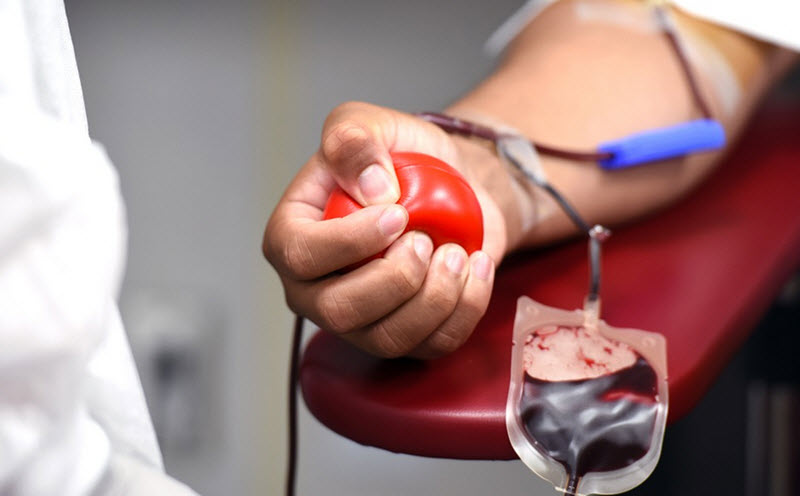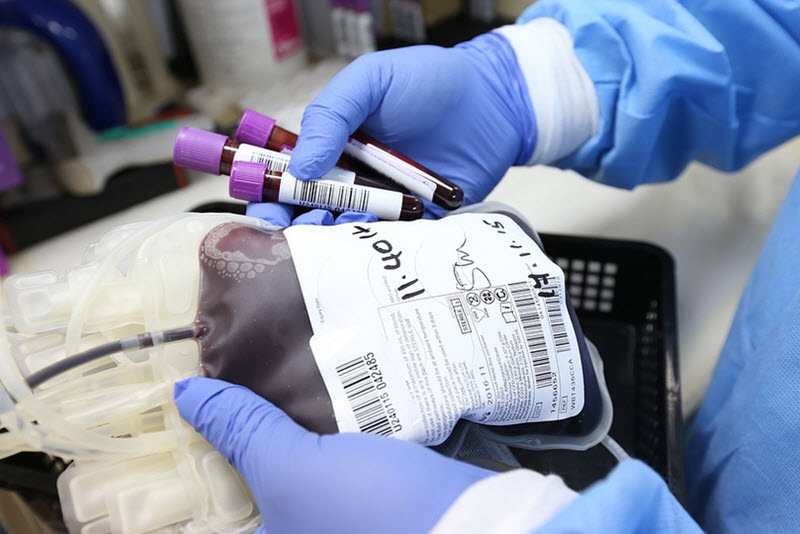An alternative to donating whole blood is to donate only the plasma. Plasma is much needed for a variety of patients, including people suffering from life-threatening trauma or burns. Many cancer patients also benefit from a plasma transfusion.
When you donate plasma-only, blood is drawn from one arm and put through a special machine. The machine removes the plasma from the blood, and then return the remaining blood (chiefly red blood cells and platelets) to your other arm, along with some saline.

How long does it take to donate plasma only?
Exactly how long the process takes vary between the different clinics, but it takes a bit longer than a normal whole blood donation since the blood needs to be processed (to separate the plasma) and part of the blood will be returned to you. Expect the donation process for plasma-only to take at least 1 hour and 15 minutes. You will be hooked up to the machine for roughly 45 of those minutes; the rest is pre-checks and post-checks.
How to prepare before the donation
- Avoid eating fatty foods close to the donation appointment, since the fat can lower the quality of your plasma.
- Drink plenty of water before the appointment to avoid behing dehydrated. (You will also be encouraged to drink something after the donation.)
- Wear clothes that make it easy for the clinic´s staff to access your arms.
After a plasma-only donation
- Drink something and have a snack right after the donation. You will stay at the clinic for a little while so the staff can make sure you feel alright.
- Avoid heavy exercise for the rest of the day.
- Your body will need 24-48 hours to replenish the donated plasma. Remember to drink plenty of water and eat healthy foods to help your body out.
How often can I donate plasma?
Donating whole blood more than six times per year is advised against, but if you donate plasma-only instead you can (under normal circumstances) donate every 28 days since taking only the plasma is less taxing on the body. There are even some clinics that will allow you to donate plasma-only every two weeks, provided you fulfil the health requirements for frequent plasma donation.
Plasma from type AB blood
It is possible to donate plasma regardless of your blood type – and plasma from all donors is needed and useful – but the most sought after plasma donor is a person with the blood type AB, because AB plasma can be given to all patients regardless of the recipient’s blood type.
The AB blood group is believed to be the result of the intermingling of Caucasian populations (where blood group A is common) and Mongolian populations (where blood group B is common). Today, the sub-continental Indian population and their descendants have a much higher incidence of AB blood than the rest of the world. This in turn means that in many countries around the globe, finding AB plasma donors is difficult. In the United Kingdom, only 2% of donors are AB, while the number for the U.S. is 4%.

Female plasma donors
Both men and women can donate plasma. However, many organisations that accept blood donations will ask female donors about their pregnancy history and test their blood for a certain type of antibody. That is because it was recently discovered that women who have been pregnant are more likely to have a certain type of antibody in their blood that increases the risk of post-transfusion complications for plasma recipients. If you test positive for this antibody, you may be recommended to donate red blood cells instead of plasma.
There are also some organisations that currently only accept plasma donations from men, or only from people who have never been pregnant.
Rewards for donating Plasma
Many plasma and blood centres will give you a reward for donating blood. You will often get a reward based on how often and how much plasma you donate. Some donation centres make it possible to earn more than USD1000 a month from donating plasma. This money is usually paid to you using a prepaid credit card. You will not get cash. Donating Plasma can be a good way to earn some extra money while at the same time helping others by providing life-saving plasma. We recommend that you invest any compensation that you receive. This will help you earn even more over time. You can use prepaid credit cards to deposit money to a trading platform that allows you to invest your money in stock, crypto and other financial instruments.
Donating blood and plasma can make you tired so do not to donate plasma to earn money if it prevents you from performing your job satisfactory.
Why you should donate blood
Donating blood is a noble act that can save lives and benefit society in various ways. Here is a list of reasons why you should consider donating blood:
- Save Lives: Perhaps the most significant reason to donate blood; your donation can be used in emergencies and for people who need long-term treatments.
- Maintain Adequate Blood Supply: Blood banks rely on the regular blood donation by healthy individuals to maintain a sufficient blood supply.
- Help Patients with Chronic Diseases: Patients with chronic diseases like thalassemia or sickle cell anemia require regular blood transfusions.
- Assist in Medical Research: Donated blood can also be used for medical research and can play a vital role in the discovery of new treatments.
- Help Accident Victims: People who have suffered severe injuries in accidents often need blood transfusions to replace the blood they have lost.
- Support Cancer Patients: Many cancer treatments can harm the body’s ability to make blood, so cancer patients often need transfusions.
- Improve Your Own Health: Regular blood donations can reduce iron levels in the blood, which may lower the risk of certain illnesses like heart disease.
- Discover Potential Health Issues: When you donate blood, it is tested for various diseases. If anything unusual is found, the blood bank will inform you.
- Help During Natural Disasters: Natural disasters can cause an urgent need for blood, especially for the people injured during the event.
- Contribute to Community Welfare: Blood donation is a community service where you can contribute to the welfare of those in need without any financial costs.
- Fulfill a Civic Duty: Contributing to the health of your community by donating blood can be seen as fulfilling a civic duty.
- Help New Mothers: Many new mothers need blood transfusions after childbirth if they experience complications.
- Psychological Benefits: Knowing you’re saving lives can instill a sense of happiness and satisfaction.
- Benefit from Blood Generation: Your body quickly replaces the blood you donate, which can help in keeping the blood flowing and maintaining good health.
- Encourage Others: When you donate blood and share your experience, you can encourage others to do the same.
Donating blood takes little time and is a safe process. If you are healthy, it’s a wonderful and selfless way to give back to the community.